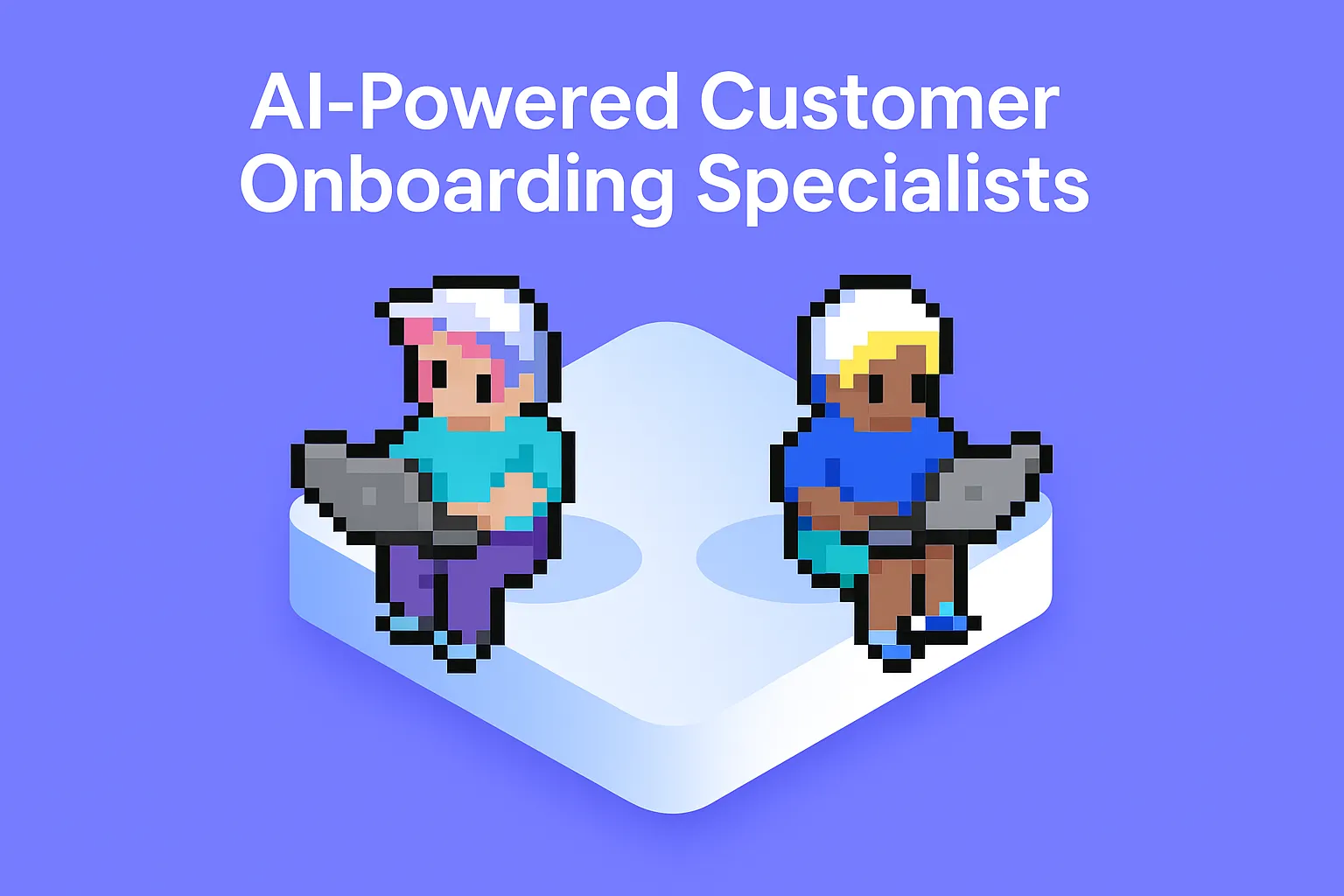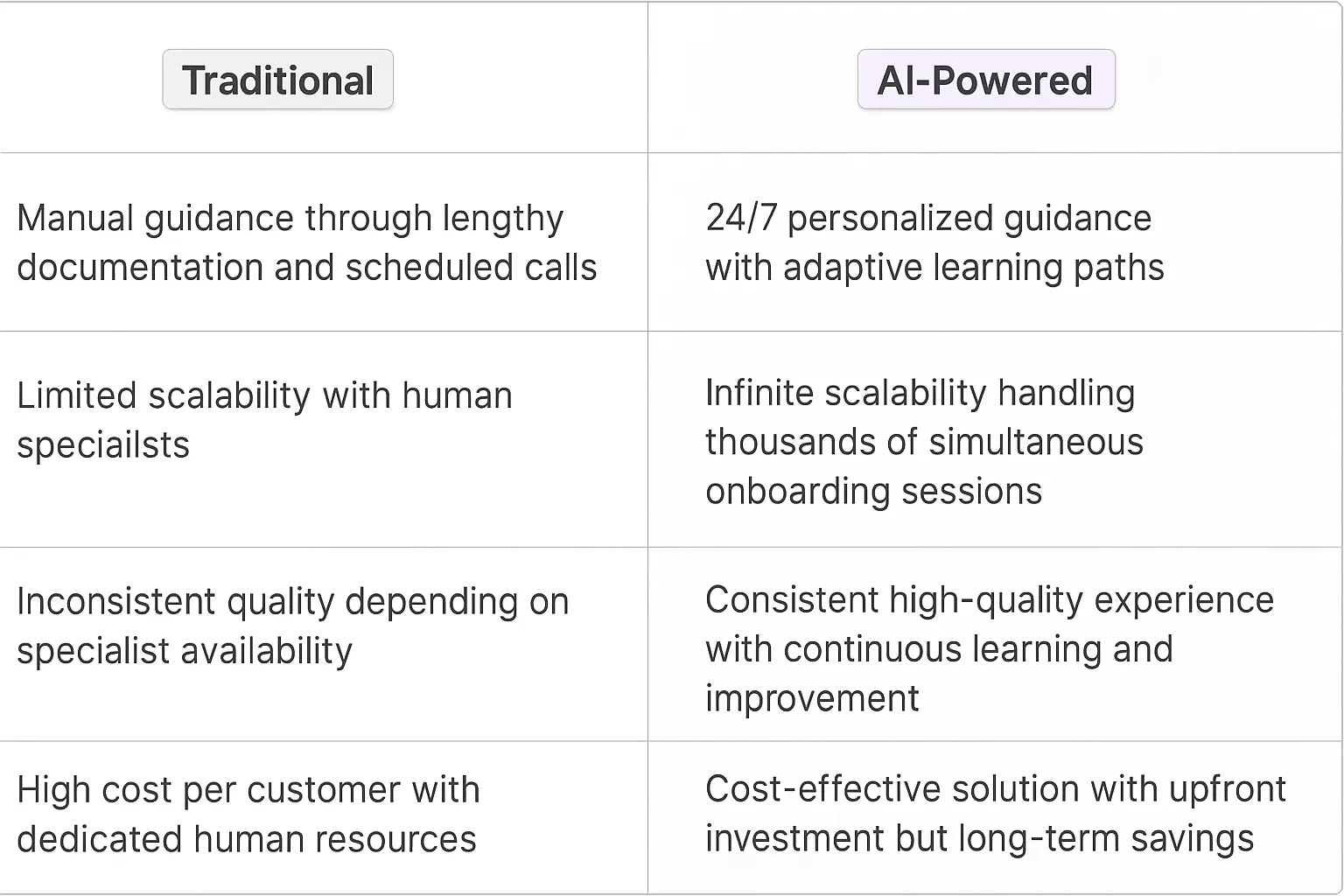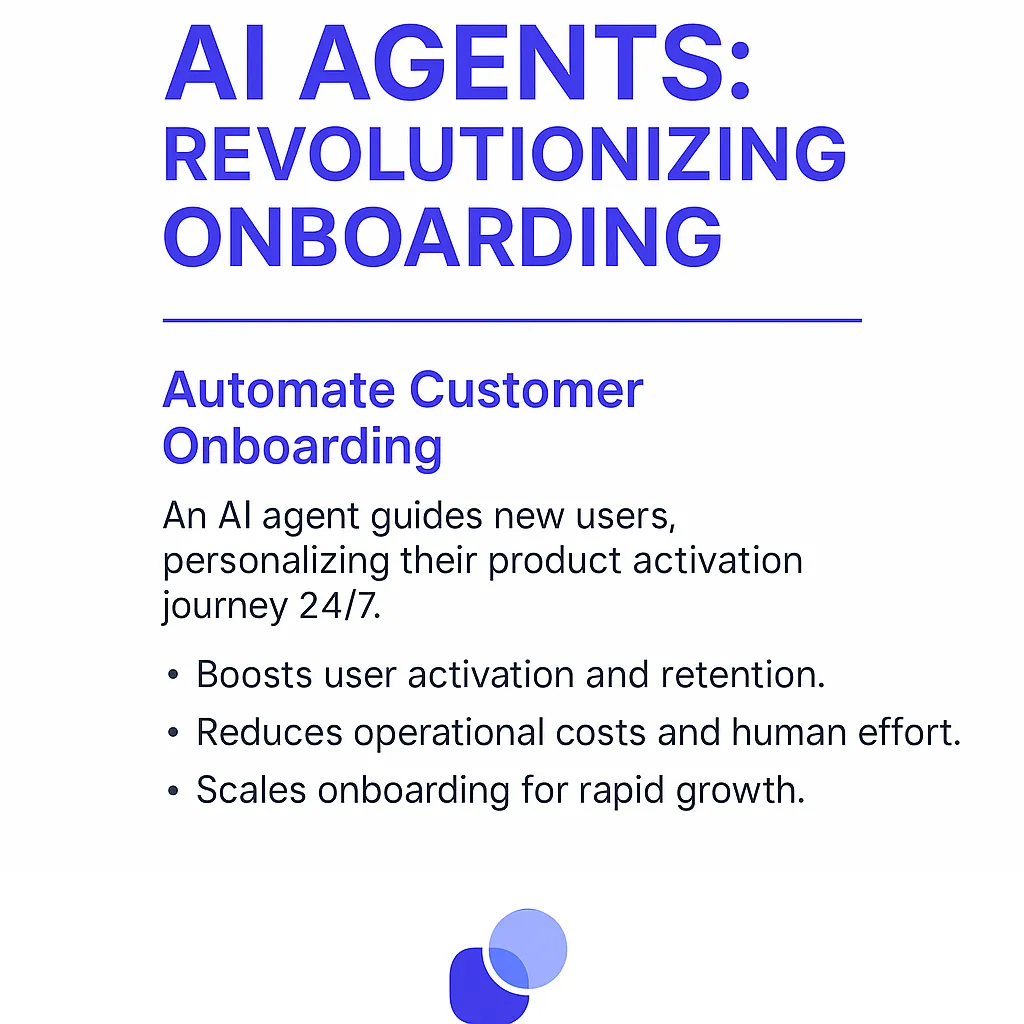A Customer Onboarding Specialist is a crucial role in any customer-facing business. Traditionally, this was a human expert who guided new customers through the initial stages of using a product or service. They were responsible for ensuring a smooth transition from prospect to active user, often through personalized demos, training sessions, and ongoing support.
But here's where it gets interesting: AI is flipping this role on its head. We're now seeing the emergence of AI-powered Customer Onboarding Specialists - digital teammates that can perform many of these tasks at scale, 24/7, and with a level of personalization that would be impossible for a human team to match.
The AI-powered Customer Onboarding Specialist is a game-changer. Here are the key features that make it so powerful:
This isn't just an incremental improvement - it's a fundamental shift in how companies approach customer onboarding. The businesses that get this right will have a significant edge in user activation and retention, setting the stage for explosive growth.

Before AI agents entered the scene, customer onboarding was a labor-intensive process that relied heavily on human specialists. These professionals would manually guide new customers through product features, answer questions, and troubleshoot issues. While effective, this approach had clear limitations in scalability and consistency.
Companies often employed a mix of tactics: lengthy documentation, tutorial videos, and scheduled onboarding calls. But let's be real - how many users actually read those docs or sit through 30-minute videos? The result was often a subpar onboarding experience that left new customers feeling overwhelmed and underserved.
AI agents are transforming customer onboarding into a high-touch, personalized experience that scales effortlessly. These digital teammates are always on, always learning, and always improving. Here's why they're a game-changer:
The real power of AI agents in customer onboarding lies in their ability to combine the best aspects of human interaction - empathy, adaptability, problem-solving - with the scalability and consistency of technology. They're not replacing human specialists; they're augmenting them, handling the routine tasks and freeing up human experts to focus on complex, high-value interactions.
As we move forward, the companies that leverage AI agents for customer onboarding will have a significant competitive advantage. They'll be able to onboard users faster, more effectively, and at a lower cost - all while providing a superior user experience. That's the kind of leverage that creates category-defining companies.
These AI agents excel at providing data-driven insights that help companies understand their customers better and optimize the onboarding process continuously.

Customer onboarding is a critical phase that can make or break a company's relationship with new users. AI agents are poised to transform this process, making it smoother, more personalized, and incredibly efficient. Let's dive into some game-changing use cases:
Breaking down the onboarding process into specific tasks, AI agents can excel in numerous areas:
The beauty of AI agents in customer onboarding lies in their ability to scale personalized attention. They're not replacing human touch points, but amplifying them. By handling routine tasks and providing 24/7 support, these digital teammates free up human specialists to focus on high-value interactions and complex problem-solving.
As AI technology advances, we'll see even more sophisticated onboarding experiences. Imagine AI agents that can predict a user's long-term success based on their onboarding behavior, or ones that can seamlessly switch between different communication styles to match a customer's preferences.
The companies that leverage AI agents effectively in their onboarding process will likely see higher activation rates, improved customer satisfaction, and ultimately, better retention. It's not just about getting users started – it's about setting them up for long-term success and turning them into passionate advocates for your product.

The versatility of AI agents in Customer Onboarding Specialist roles makes them valuable across various industries. Let's dive into some meaty, industry-specific use cases that showcase how AI can transform workflows and processes.
Think of these AI-powered digital teammates as the secret sauce that takes customer onboarding from a necessary evil to a competitive advantage. They're not just filling out forms or sending welcome emails – they're crafting personalized experiences that make new customers feel like VIPs from day one.
In the following examples, we'll explore how these AI agents are rewriting the playbook for customer onboarding across different sectors. From fintech to e-commerce, we'll see how they're not just meeting expectations, but blowing them out of the water. Get ready for some eye-opening insights that might just change how you think about onboarding forever.
These AI agents excel at customer segmentation, allowing them to provide highly targeted onboarding experiences based on user profiles and behaviors.
The fintech industry is ripe for disruption, and Customer Onboarding Specialist AI Agents are leading the charge. These digital teammates are transforming how financial institutions welcome new clients, making the process smoother, faster, and more personalized than ever before.
Take Robinhood, for example. They could deploy an AI-powered onboarding specialist that guides users through the complexities of opening their first investment account. This AI doesn't just collect information; it educates users on market basics, explains financial jargon, and even helps set initial investment goals based on the user's risk tolerance and financial situation.
The beauty of this AI-driven approach is its scalability. Unlike human customer service reps, these digital teammates can handle thousands of new users simultaneously, providing each with a tailored experience. They can work 24/7, ensuring that a potential investor in California can open an account at 2 AM just as easily as someone in New York during business hours.
But it's not just about efficiency. These AI agents can significantly reduce dropout rates during the onboarding process. By intelligently addressing common pain points - like confusion over required documentation or hesitation about sharing financial information - they keep users engaged and moving forward. They can even use predictive analytics to identify when a user is likely to abandon the process and intervene with targeted assistance or incentives.
Moreover, these AI agents can adapt their communication style based on user preferences. Whether someone prefers detailed explanations or quick, to-the-point instructions, the AI can adjust accordingly. This level of personalization was previously impossible at scale.
The potential impact on customer acquisition costs is enormous. By automating and optimizing the onboarding process, fintech companies can dramatically reduce the resources needed to convert leads into active users. This could be a game-changer in an industry where customer acquisition costs have been steadily rising.
As these AI agents learn and improve over time, they'll become increasingly sophisticated. They might start predicting which products or services a new user is likely to need in the future, setting the stage for personalized upselling opportunities down the line.
The fintech companies that embrace this technology early will have a significant competitive advantage. They'll be able to scale their user base faster, provide better customer experiences, and ultimately, capture a larger share of the market. It's not just an improvement on the old way of doing things - it's a fundamental reimagining of the customer onboarding process.
The e-commerce landscape is fiercely competitive, and customer onboarding is often the make-or-break moment for online retailers. Enter Customer Onboarding Specialist AI Agents - the secret weapon that's giving innovative e-commerce players a serious edge.
Let's look at how a company like Shopify could leverage these digital teammates. They could deploy an AI agent that doesn't just sign up new merchants, but becomes their personal business advisor from day one. This AI would guide users through setting up their online store, but that's just the beginning.
The real magic happens when the AI starts analyzing the merchant's product catalog, target audience, and business goals. It could suggest optimal store layouts, recommend pricing strategies based on market trends, and even propose marketing campaigns tailored to the merchant's niche.
What's particularly exciting is how these AI agents can level the playing field for small businesses. They essentially provide each new merchant with a virtual team of e-commerce experts, available 24/7. This kind of support was previously only accessible to large corporations with deep pockets.
The AI's ability to learn and adapt is a game-changer. As it onboards more merchants, it gains insights into what works for different types of businesses. It might discover that vintage clothing stores perform better with a certain color scheme, or that handmade jewelry sellers see higher conversion rates with specific product photography styles. These insights get fed back into the onboarding process, making each new merchant more likely to succeed than the last.
But it's not just about setting up the store. These AI agents can continue to provide value long after the initial onboarding. They could monitor the store's performance, alerting the merchant to potential issues before they become problems. Inventory running low? The AI flags it. Sudden drop in traffic? The AI suggests potential causes and solutions.
The impact on Shopify's business could be profound. By dramatically improving the success rate of new merchants, they could see higher retention rates and increased platform loyalty. This, in turn, could lead to more word-of-mouth referrals and a stronger brand reputation in the e-commerce space.
Moreover, the data collected by these AI agents could be invaluable for Shopify's product development. They'd have unprecedented insights into the challenges faced by merchants at every stage of their journey, allowing them to continually refine their platform and stay ahead of competitors.
The e-commerce platforms that nail this AI-driven onboarding approach will likely see explosive growth. They'll be able to attract more merchants, help those merchants succeed at a higher rate, and build a more robust ecosystem around their platform. It's not just an incremental improvement - it's a fundamental shift in how e-commerce platforms support and empower their users.
Implementing a Customer Onboarding Specialist AI Agent isn't just about slapping some code together and calling it a day. It's a complex dance of data, algorithms, and user experience that requires serious technical chops.
First off, you're dealing with the beast that is natural language processing. Your digital teammate needs to understand the nuances of human communication, from decoding industry jargon to picking up on subtle contextual cues. It's like teaching a computer to read between the lines – no small feat.
Then there's the integration nightmare. Your AI agent needs to play nice with existing CRM systems, knowledge bases, and customer support tools. It's not just about API calls; it's about creating a seamless flow of information that feels natural to both the customer and your human team members.
Data privacy and security are another minefield. You're handling sensitive customer information, so your AI needs to be Fort Knox-level secure. One data breach, and you're not just losing customers – you're potentially facing legal repercussions that could sink your startup faster than you can say "GDPR violation."
On the operational side, things get even trickier. You're essentially asking your team to trust a digital entity with one of the most crucial parts of your business: customer relationships. That's a tough pill to swallow for many organizations.
Training the AI is a massive undertaking. It needs to understand your product inside and out, grasp your company's voice and values, and be able to handle a wide array of customer scenarios. This isn't a set-it-and-forget-it situation; it requires constant refinement and updates as your product and customer needs evolve.
There's also the challenge of managing customer expectations. Some will love the instant responses and 24/7 availability. Others might feel shortchanged if they can't immediately speak to a human. Striking the right balance between AI efficiency and human touch is crucial.
Finally, there's the question of metrics and KPIs. How do you measure the success of your AI onboarding specialist? Is it just about speed and volume, or do you need to factor in customer satisfaction and long-term retention? Getting this wrong could lead you down a path of optimizing for the wrong outcomes, potentially damaging your customer relationships in the long run.
Implementing a Customer Onboarding Specialist AI Agent is a high-stakes game. Get it right, and you could dramatically scale your onboarding process while improving customer satisfaction. Get it wrong, and you risk alienating customers before they've even fully experienced your product. It's a classic high-risk, high-reward scenario – exactly the kind of challenge that separates the unicorns from the also-rans in the startup world.
The rise of AI-powered Customer Onboarding Specialists marks a pivotal shift in how businesses welcome and activate new users. This isn't just about automating a process - it's about reimagining the entire onboarding experience.
These digital teammates offer a unique blend of scalability and personalization that was previously impossible. They're available 24/7, learn continuously, and can adapt to each user's specific needs. The result? Faster time-to-value for customers, higher activation rates, and ultimately, better retention.
But let's be real - implementing this technology isn't a walk in the park. It comes with significant technical and operational challenges. From natural language processing hurdles to the complexities of integrating with existing systems, there's a lot to navigate.
Despite these challenges, the potential upside is massive. Companies that successfully deploy AI onboarding specialists will likely see a step-change improvement in their customer acquisition and retention metrics. They'll be able to scale their user base faster and more efficiently than ever before.
As we move forward, expect to see AI onboarding specialists become a standard feature in high-growth companies across industries. Those who fail to adapt may find themselves at a significant competitive disadvantage.
The future of customer onboarding is here, and it's powered by AI. The question isn't whether to adopt this technology, but how quickly you can implement it and start reaping the benefits. In the race for customer acquisition and retention, AI onboarding specialists might just be the nitro boost you need to pull ahead of the pack.